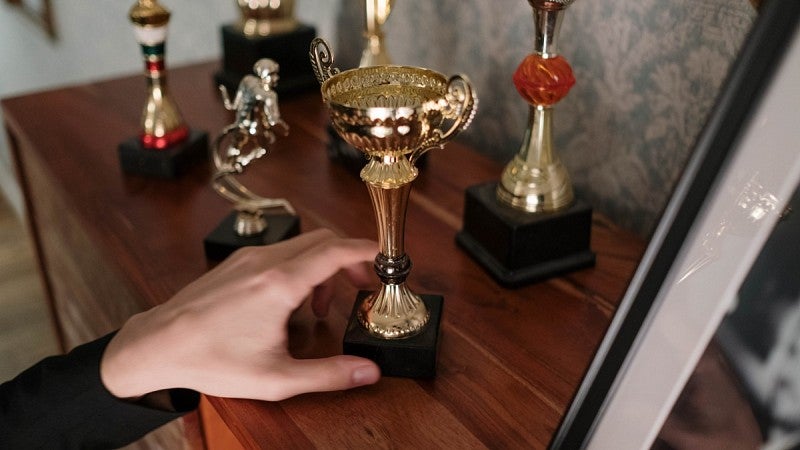
A lot has changed in the world this year, including the business and communication decisions of many large companies and organizations. UO students are researching these ripple effects — and winning national awards for their work.
For the second year in a row, three students from the School of Journalism and Communication’s strategic communication master’s program won the Arthur W. Page Society’s Jack Koten Page Principles Case Study Award, the Page Case Study Competition Grand Prize, in corporate communications. Another UO student team came in second place.
Carrie Wanous, Maddie Tew and Karina Peterson’s winning case study, “Masks Are the New Boarding Pass: Delta Air Lines Implements Strict Mask Mandate,” analyzed Delta Air Lines’ decision to place travelers on a no-fly list if they refuse to follow the mask mandate airlines put into place during the coronavirus pandemic.
Last year, a team of strategic communication master’s students won the Koten Award for a case study examining Dick’s Sporting Goods’ decision to halt gun sales at 125 locations.
“People all over the country now know that the University of Oregon is producing great students and great content,” said Donna Davis, director of the strategic communication master’s program at SOJC Portland. “We have some of the best thinkers in the business in our program.”
To complete their award-winning Delta Air Lines case study, the 2021 student team researched Delta’s core values, financials before and after the coronavirus pandemic, and how the airline has navigated anti-maskers.
At first, the trio focused on NASCAR banning the confederate flag and that decision’s impact on the company. However, they eventually shifted to the Delta Air Lines case study because they knew it was timely and could have a significant impact.
The team’s personal experience also influenced its choice in case studies. Wanous and Peterson, who both took flights with two different airlines during the pandemic, saw firsthand how masks were being enforced throughout the journey.
“I really wanted to dig deeper into the nitty-gritty of why things are going this route. Are they going to stay this route? How is this impacting other people? What are other airlines doing?” Peterson said. “Since Carrie had flown with Delta, we began building off of that. While there is no federal mask mandate, there are certain airlines that are dead set on ‘no mask, no fly,’ while other airlines aren’t going as far as that.”
The team concluded that Delta’s Air Lines’ decision to ban over 500 people for refusing to follow its mask mandate had received mixed reactions. The long-term effects of this decision and whether the airline will continue to enforce masks on their airplanes are unknown.
The case study showed that Delta doesn’t take the safety of their employees for granted and that the company wants to build trust and show customers they are taking the pandemic seriously.
A second team that includes strategic communication master’s students Andy Jobanek and Steven Lozano, as well as communication and media studies doctoral student Isaac Bisilki, placed second in the Page Case Study Awards with “NBA Players’ Strike: How the NBA Responded to an Unprecedented Work Stoppage Following the Jacob Blake Shooting.” They examined the Milwaukee Bucks basketball team’s refusal to play game 5 of their first-round playoff series against the Orlando Magic basketball team after the shooting of Jacob Blake by police officers in Kenosha, Wisconsin.
This set the tone for other teams to boycott their playoff games and stop play in the NBA bubble for three days. The students researched how the NBA responded to players’ demand both before and after the players’ strike and examined its use of social media to increase social and political issues. The case study determined that the NBA is an authentic voice in social justice activism.
“Sports often gets called a distraction from real-world stuff, and the crisis within the players interested me and made me think how a sports league like the NBA could advocate for social justice issues and do it effectively,” Jobanek said.
In their presentation, the students highlighted how the NBA’s social media posts on the first day of the strike received fewer likes and other engagements compared to NBA’s posts celebrating National Dog Day.
The trio concluded that the NBA’s election-day social media posts received the most engagement because that was the only topic it posted about, and NBA players were more engaged with the 2020 U.S. presidential election (96 percent of the league was registered to vote). The NBA also turned a vast majority of its arenas into polling centers.
However, while the NBA was focused on supporting the Black Lives Matter movement, NBA team governors donated almost $9 million to Republican political candidates from 2016 through 2020.
Creating a case study for the Page Society’s case study competition is written into the syllabus of the Foundations class in the strategic communication master’s program, as it helps the students bridge what they’re learning in the classroom with real-world experience through the competition.
“Students should be able to look at economic, political and social issues from every perspective and reflect on how the organization or company reacts to them as well as the consequences of those actions,” Davis said.
— Alli Weseman ’22
Alli Weseman (she/her/hers) is a first-year student in the SOJC’s multimedia journalism master’s program in Portland. She has freelanced for Portland Monthly Magazine and hopes to work in a newsroom one day. You can find more of Alli’s work at alliwesemanphotography.com.
